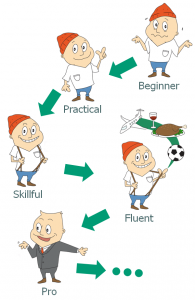When Learning to Speak English Abroad – 5 Mistakes You Cannot Afford!
 Living in a foreign country is a great way to learn the language that is spoken there, but it doesn’t guarantee that you will learn that language. To learn as much of the language as possible when living abroad AVOID making these common mistakes.
Living in a foreign country is a great way to learn the language that is spoken there, but it doesn’t guarantee that you will learn that language. To learn as much of the language as possible when living abroad AVOID making these common mistakes.
1. Be afraid or embarrassed of speaking that language
Being afraid of speaking is not a legitimate reason to not try. Whatever your level of vocabulary, the strength of your accent, how wobbly your pronunciation is, if you don’t just TALK, you will never improve. Rely on people to correct you as that is the only way you will learn.
2. Live in a neighborhood in the city that is full of your native language speakers
The comfort of living in a neighborhood that is full of people from your native country comes at the price of making it harder to learn the local language. Once you establish your social circle and get into a routine you will find it hard to break from that and make a new one.
3. Live with roommates from your own country
It is a great advantage to live with local English-speaking inhabitants of the city where you are learning the language. Over a period you will adopt some of their habits and understand their attitudes, as well as learning to hold conversations in English that cover a wide range of topics.

4. Make friends with people from your country
Although living in a foreign country is hard and it is understandable that you might long for the ease of communicating with someone in your own language, the effort involved in forming friendships with people who speak English with you is well worth it – your progress will be much faster.
5. Think that classroom study is enough
True language learning doesn’t happen inside of a classroom, it happens when you live the language. That is why Study Abroad makes such sense if you are serious about learning a new language. You need to make a lifestyle out of learning that language, getting exposure to it wherever you can. Change your Facebook to the language you’re studying, watch TV and listen to podcasts in that language, listen to music, read books. Use every opportunity to expose yourself to the language




















